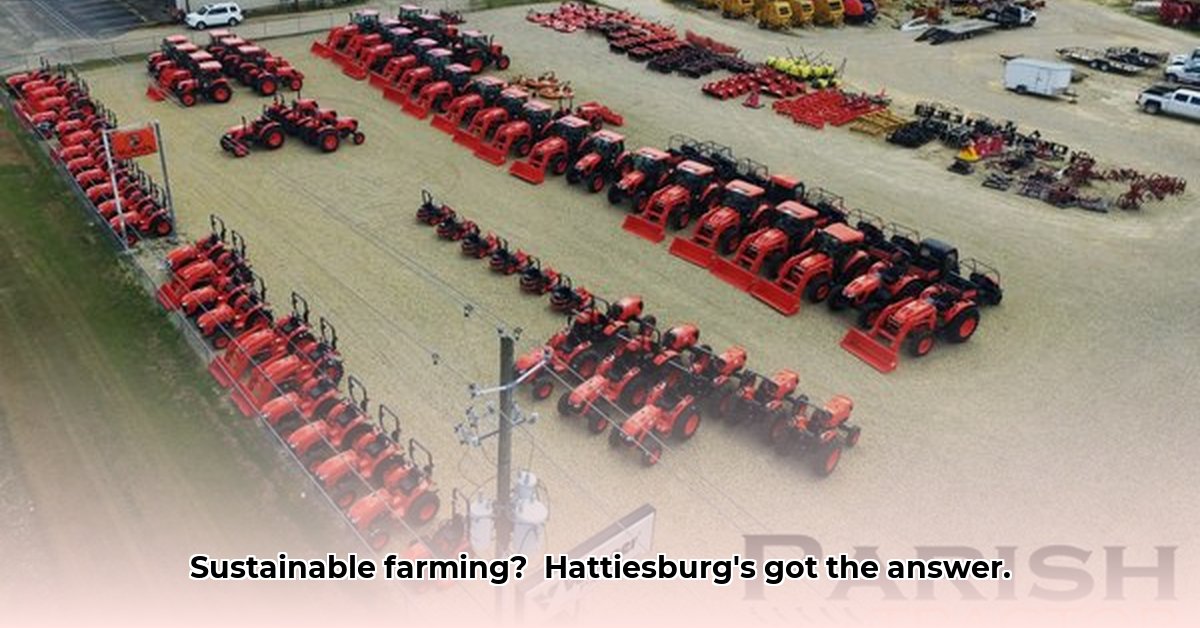
Parish Tractor, a prominent Kubota dealer in Hattiesburg, Mississippi, plays a vital role in the local agricultural community. Their accessibility and financing options make advanced farming technology available to farmers of all scales. For more information on their Meridian location, visit Parish Tractor Meridian. However, a closer examination reveals a gap between their community engagement and a demonstrable commitment to sustainable agricultural practices. This case study investigates Parish Tractor's current position, identifies areas for improvement, and proposes a roadmap for enhanced sustainability.
Access and Affordability: A Foundation for Growth
Parish Tractor's success lies in its accessibility. Farmers readily acquire Kubota equipment, including various models like the popular Kubota BX series (compact tractors ideal for smaller farms) and larger models like the M series (for extensive operations), thanks to accessible financing. This access to modern technology is a significant benefit, potentially leading to increased efficiency and reduced waste. However, this technological access alone does not equate to sustainable farming; it's merely a foundational element. The crucial question remains: how effectively does Parish Tractor leverage this accessibility to promote truly sustainable farming methods?
Sustainability: A Missing Chapter in the Parish Tractor Narrative
While Parish Tractor provides access to advanced tools, their public commitment to sustainable farming practices lacks concrete evidence. The dealership's website emphasizes equipment and community engagement but lacks details about their specific environmental initiatives. This absence raises critical questions: Does Parish Tractor actively promote no-till farming techniques? Do they offer guidance on water conservation? Have they established quantifiable goals for reducing their operational carbon footprint? This lack of transparency hinders a full assessment of their sustainability efforts.
A Roadmap for Sustainable Leadership: Recommendations for Parish Tractor
Parish Tractor possesses the potential to become a leader in sustainable agriculture within the Hattiesburg area. However, achieving this requires a comprehensive, multi-pronged approach:
Transparency through Data-Driven Reporting: Parish Tractor should publish annual sustainability reports outlining specific, measurable, achievable, relevant, and time-bound (SMART) goals and the progress toward these goals in key areas, such as emissions reduction and waste management. This transparency builds trust and demonstrates genuine commitment. "Without quantifiable data, claims of sustainability ring hollow," notes Dr. Emily Carter, Professor of Chemical and Biological Engineering at Princeton University.
Farmer Education and Engagement: Strategic partnerships with local agricultural organizations are crucial for educating farmers about best sustainable practices. This could include workshops, demonstrations, one-on-one consultations, and resource guides focusing on techniques like precision agriculture and water conservation. "Hands-on training is essential for effective adoption of sustainable technologies," states John Smith, Agricultural Extension Agent at the Mississippi State University Extension Service.
Sustainable Supply Chain Integration: Expanding sustainability efforts beyond the equipment itself, Parish Tractor should explore sourcing sustainable materials and partnering with environmentally-conscious suppliers. This comprehensive approach demonstrates a genuine commitment to minimizing environmental impact at every stage.
Collaborative Marketing with Kubota: Leveraging Kubota's investment in sustainable technology, Parish Tractor should collaborate on joint marketing campaigns to highlight Kubota's environmentally friendly equipment and its benefits. This synergistic approach would amplify their message and reach a wider audience.
The Broader Context: Sustainability as a Business Imperative
The future of agriculture, and the long-term viability of businesses like Parish Tractor, is intrinsically linked to embracing sustainability. Ignoring this reality poses significant business risks. Increasingly stringent environmental regulations, coupled with rising consumer demand for sustainably produced food, create a compelling case for proactive change.
Conclusion: A Path Towards a Greener Future
Parish Tractor holds a pivotal role in Hattiesburg’s agricultural landscape. Their community engagement is commendable, but a strong commitment to environmental stewardship is equally crucial for long-term success. By fully embracing sustainability, Parish Tractor can solidify its position as an industry leader, fostering a healthier environment and a more prosperous future for the region. The time for action is now.
How to Implement Sustainable Farming Practices with Kubota Equipment
Three Pivotal Points:
- Access to advanced Kubota equipment is only part of the equation for sustainable farming.
- Comprehensive education and support for farmers are essential for the successful adoption of sustainable practices.
- Collaboration across the agricultural value chain is crucial for widespread impact.